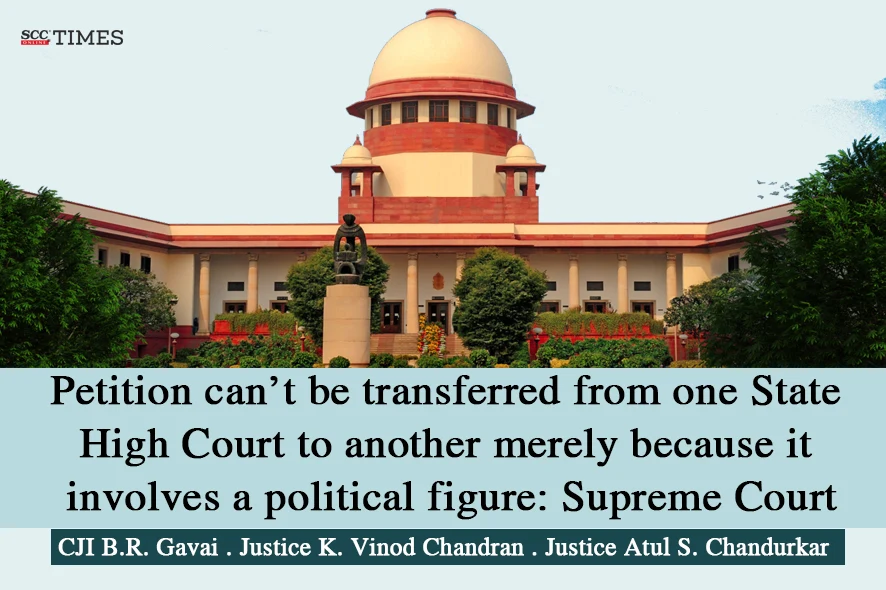Supreme Court: While deliberating over a suo motu contempt petition which originated from a petition seeking transfer of a criminal petition from Telangana High Court to Bombay High Court citing alleged partiality of a Single Judge Bench of Telangana High Court; the 3-Judge Bench of B.R. Gavai, CJI.*, K. Vinod Chandran and Atul S. Chandurkar, JJ., held that merely on the basis that a petition involves a political figure in a State, cannot constitute a ground to transfer the proceedings from the High Court of that State to the High Court of another State. The Court grimly took note of a recurring trend that whenever any matter involves a political figure in a particular State, petitions for transfer of proceedings from that State to any other State is sought, alleging that a litigant may not get justice in that State.
The Court also clarified that within the constitutional edifice, the Judges of the High Court are not inferior to the Judges of the Supreme Court. Though, as an appellate Court, the Supreme Court can affirm, reverse, modify or set aside the judgment of the High Court; however, Supreme Court has no administrative control, either over the administration of the High Court or the Judges of the High Court. The Court firmly stated that High Court Judges are also Constitutional functionaries, and they enjoy the same immunity as is enjoyed by a Judge of the Supreme Court. “In our view, when scandalous allegations are made against the Judges of the High Court, it becomes the duty of this Court to protect the Judges of the High Court”.
Background:
A transfer petition was filed seeking to transfer a Criminal Petition from the High Court of Telangana to the High Court of Judicature at Bombay, Nagpur Bench. The grounds, inter-alia, on which the said Criminal Petition was sought to be transferred was that the conduct of the Single Judge of the High Court of Telangana, who was hearing the matter, gave rise to serious apprehension of partiality and procedural discrimination. The alleged contemnor had alleged that his counsel’s arguments were summarily curtailed and that he was given only five minutes to argue the matter.
The alleged contemnor further submitted that due to the political status of Respondent 1, he believed that there existed a likelihood of derailment of justice.
The Supreme Court had rejected the transfer petition; however, the Court had taken into account the scandalous and scurrilous remarks made against the High Court Judge. Thus, the Court had issued notice to the alleged contemnor, the Advocate-on- Record, who had filed the petition and the counsel, who had drawn the petition as to why an action for committing contempt of the court should not be initiated against them.
Court’s Observations:
Taking note of the affidavits of apology presented by the parties and relevant case laws, the Court pointed out that the counsel who signs applications or pleadings containing matter scandalizing the Court without reasonably satisfying themselves about the prima facie existence of adequate grounds are themselves guilty of contempt of court. The Court further explained that when a lawyer is faced with a conflict between his duty towards the Court and duty towards the client, he has to give preference to duty to the Court rather than duty to the client.
The Court further said that it has noticed that nowadays it has become a trend amongst lawyers to criticize the Judges of the High Court or the Trial Court for no reason. Further clarifying that High Court Judges have similar immunity as that of a Supreme Court Judge, the Court stated that High Court Judges are appointed under the Constitution and upon assuming the office, they take an oath to act without any fear or favour, affection or ill-will and to uphold the Constitution and the laws.
“To imply that because a political figure is involved in a case, and therefore, a holder of such a high constitutional office would not act independently, in our view, scandalizes the very institution of administration of justice”.
Perusing the affidavit of apology, the Court noted that apology was tendered only to the Supreme Court. The Court opined that since scandalous remarks were made against the High Court Judge, therefore it would have been appropriate if the apology was tendered to the High Court Judge.
Taking note of the alleged contemnors seeking permission to tender apology to the High Court Judge, the Court therefore allowed the alleged contemnors to tender an unconditional apology.
Before concluding, it was emphasised that Courts gain no pleasure in penalizing or sentencing the lawyers for acting in a manner which would amount to Contempt of the Court.
[N. Peddi Raju, In Re., 2025 SCC OnLine SC 1694, decided on 11-8-2025]
*Judgment by Justice B.R. Gavai, Chief Justice of India
Advocates who appeared in this case:
For alleged contemnors: Mr. Varun Thakur, Adv. Ms. Shraddha Saran, Adv. Mr. Ramkaran, Adv. For M/s Varun Thakur & Associate, AOR Mr. S. Nagamuthu, Sr. Adv. Mr. Ranbir Singh Yadav, AOR Mr. Prateek Yadav, Adv. Mr. Puran Mal Saini, Adv. Ms. Anzu K. Varkey, Adv. Mr. Yogesh Yadav, Adv. Mr. Mohammed Shahrukh, Adv. Mr. Sanjay R. Hegde, Sr. Adv. Mr. M. R. Shamshad, Sr. Adv. Mr. James P. Thomas, AOR Mr. Ankit Tiwari, Adv. Mr. Tanay Hegde, Adv. Mr. Rahul Singh, Adv. Mr. Vishal Jogdand, Adv. Mr. Pratik Bombarde, Adv. Mr. Rishi Raj Singh, Adv. Mr. Saurabh Singh, Adv.
For SCAORA: Mr. Vipin Nair, Adv. Mr. Amit Sharma, Adv. Mr. Nikhil Jain, Adv. Mr. Kaustabh Shukla, Adv.







